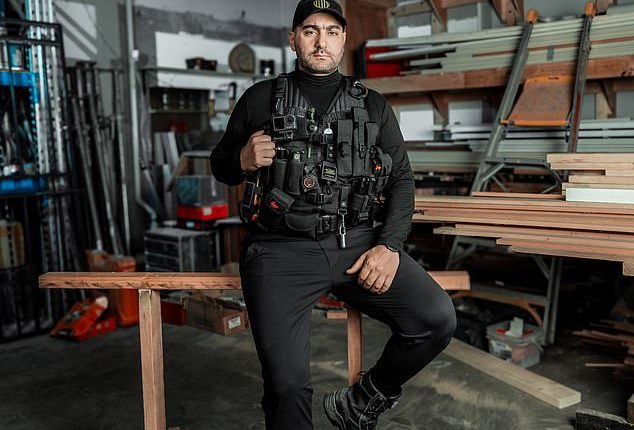A property inspector who exposes dodgy new builds has revealed the best way Australians can avoid getting caught out when buying a home.
Zeher Khalil, who goes by the moniker ‘TikTok Inspector’, has used his decade in construction to inform potential buyers on how to avoid poorly built homes.
Clad in black clothes, the 43-year-old uses a body camera and phone to shine a light on every crack or shaky awning at new properties.
The videos are a way to raise awareness about his day-to-day, Melbourne-based business ‘Site Inspections’, which provides customers with forensic assessments.
The aim, he told Daily Mail Australia, is to save people from losing money by highlighting issues before they move in and the builders leave the property.
‘It’s one of the biggest investments you will ever have in your life,’ he said.
‘These guys that we’re busting, they’re just scammers and I’m glad we’re naming and shaming most of them.’
While inspections by his company can cost up to a few thousand dollars, Mr Khalil has shared some steps for buyers to avoid their dream homes becoming a nightmare.

Property inspector Zeher Khalil (pictured) has warned Australians to always hire independent inspectors when surveying their new homes
Don’t trust the display home
‘Sometimes a display home is made by the A-team,’ he said, adding that this doesn’t always guarantee they will also be the builders behind the other properties.
‘The company will get different supervisors for different jobs, and you might end up with a different kind of home,’ he said.
As a result, Mr Khalil advised buyers to keep an eye on the property during its progress to follow changes that are made.
Always get an independent inspection
Leading on from his first suggestion, Mr Khalil advised bringing in an expert throughout the construction process.
‘If you’re building (a home), before you make a payment, or you go to make a final stage payment, get it checked,’ he said.
‘Because you might not see it again, and you might not be getting what you’re paying for.’
But even if a buyer isn’t able to afford an independent inspector, Mr Khalil suggested customers tell the builders they are planning to.
‘If they resist, that is a massive indicator that you have to get someone to look at it because these guys are trying to hide something,’ he said.

Mr Khalil said new homeowners need to inspect the properties before their final payment
He said homeowners he previously worked for have told builders they are bringing in an independent inspector and the job has been delayed, cleaned up or fixed.
Read the contract
‘Read the contract like you’re suing them tomorrow,’ Mr Khalil said, warning that there could be clauses that customers might not expect.
‘If you’re late on payment, or you have to accept alternative solutions, there’s all these things that come up later on.
‘People just sign the contract, they don’t even read it.’
The inspector said a lawyer costs a few hundred dollars but it would be worth it to make sure ‘no shifty things’ are in the contract.
Never use the builders’ surveyor or certifier
Builders sometimes recommend a surveyor who gives a building permit, but Mr Khalil advised buyers to ‘always consult someone else’.
‘Get someone independent, not someone who’s recommended by a builder, because most likely, they’ll be more lenient,’ he said.
‘You want somebody to be really assertive and stringent with their findings.’

The inspector said cracks in external walls or on the pavement can be a warning sign
What to focus on
Mr Khalil suggested there are three features on properties that should always be checked when buying: the roofing, bathrooms and balconies.
He said these locations are the most common areas that have potential issues with water.
‘Water just destroys everything and that’s the biggest problem here in Australia,’ he said.
‘Get those assessed properly and watch out for what’s going on.’
He also advised that, if there is any subsidence in the pavement around the home or if there are cracks in the external walls, this could mean there is ‘movement in the slab’.
The Victorian Building Authority has previously described this issue as ‘foundation movement’ or ‘slab heave’.
When the foundation lifts excessively in part of a house, this can then develop cracks.
Mr Khalil also pointed to ‘patched up bricks’ as a sign that vendors might be ‘trying to hide something’.








